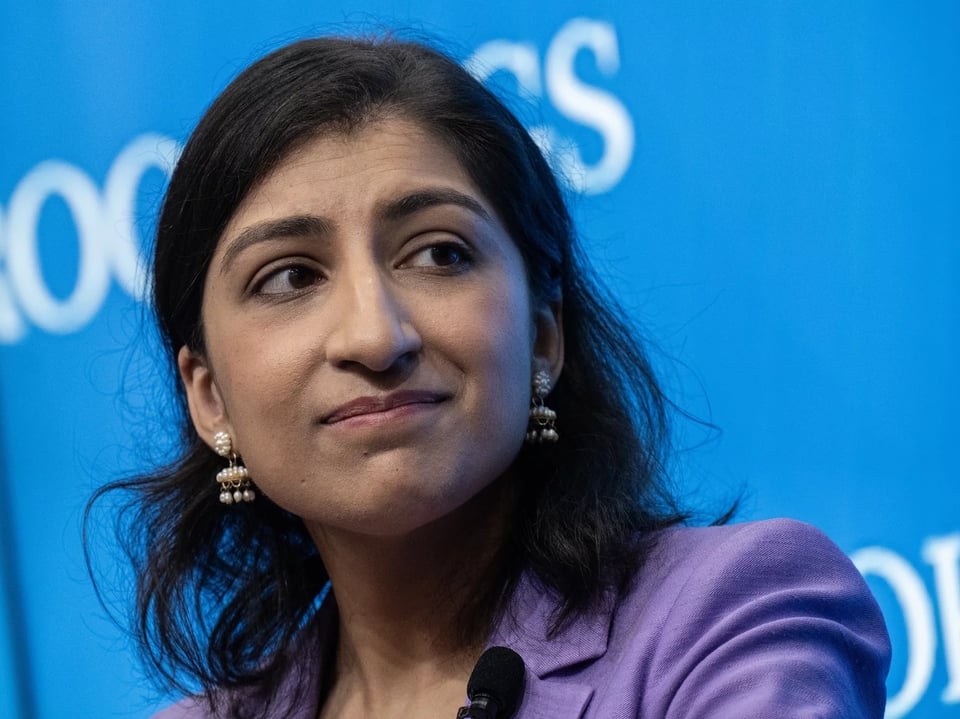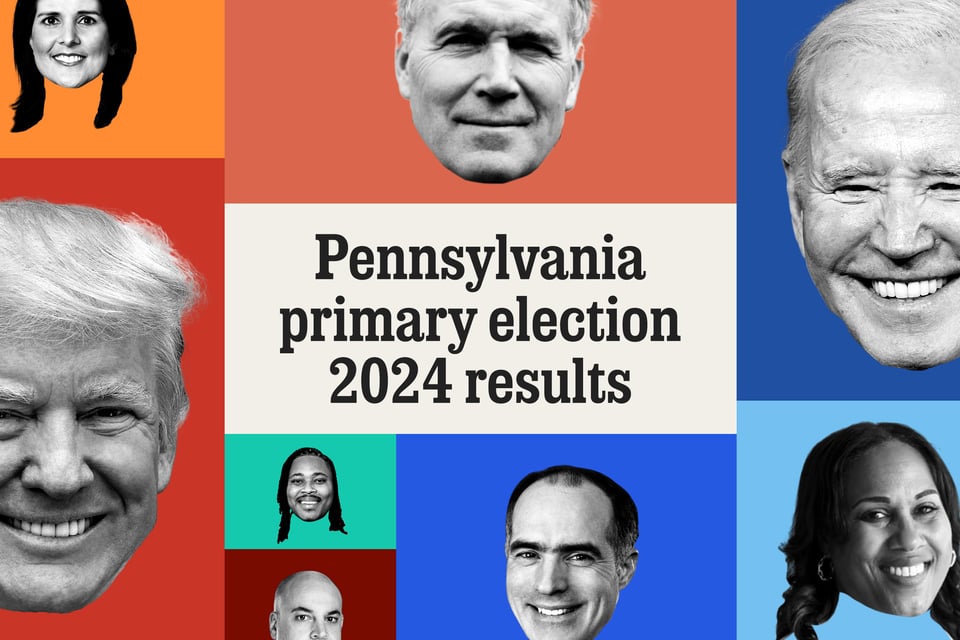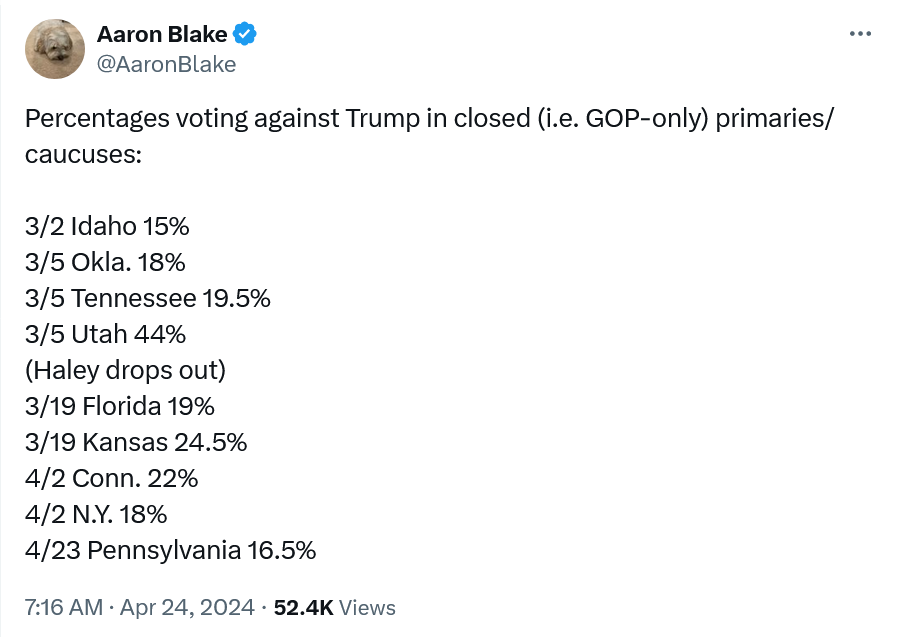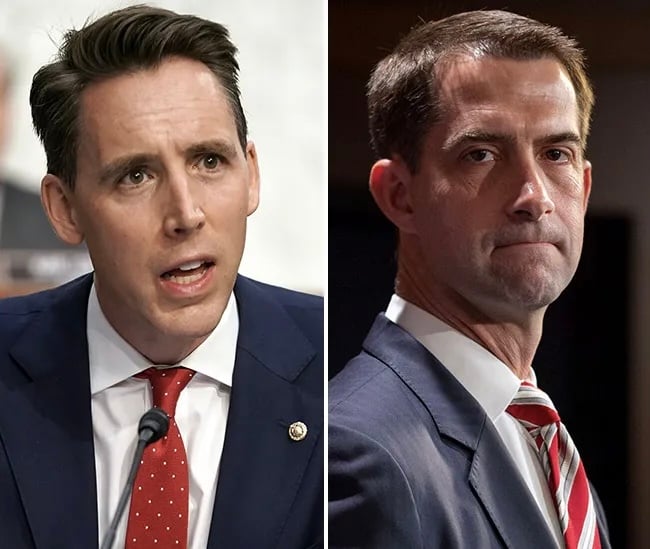Thursday, April 25, 2024. Annette’s News Roundup.
I think the Roundup makes people feel not so alone.
To read an article excerpted in this Roundup, click on its blue title. Each “blue” article is hyperlinked so you can read the whole article.
Please feel free to share.
Invite at least one other person to subscribe today! https://buttondown.email/AnnettesNewsRoundup
Remember: when you share the Roundup, you are fighting Fascism and helping to bring about a Democratic victory in 2024.
___________________________________________
Joe is always busy.
Watch 👇 the video the North America Building Trade Unions released on why they are endorsing Joe Biden.
Whoa!
— Nick Knudsen 🇺🇸 (@NickKnudsenUS) April 24, 2024
Wonder why the North America Building Trade Unions (@NABTU) just endorsed President Biden and NOT Trump?
Watch and share the 🔥🔥🔥 video they just released!! Please share. #UnionsForAll
pic.twitter.com/q9toJHWG4M
Watch 👇 the President and Transportation Secretary Buttigieg on the new rules they put into place for the airlines.
Too often, airlines drag their feet on refunds or rip folks off with junk fees.
— President Biden (@POTUS) April 24, 2024
It's time Americans got a better deal.
Today, my Administration is requiring that airlines provide automatic refunds to passengers when they're owed, and protect them from surprise fees. pic.twitter.com/2nPHxWhkBG
Our President, witty and truthful. Watch him. Touch.👇
President Biden: “Remember when [Trump] was trying to deal with COVID, he suggested, inject a little bleach in your veins. He missed it. It all went to his hair.” pic.twitter.com/gEzaBiDaNX
— Republicans against Trump (@RpsAgainstTrump) April 24, 2024
Biden-Harris activism on behalf of workers.
FTC bans most noncompete agreements between employers and workers.

Federal Trade Commission Chair Lina Khan has said noncompete agreements stop workers from switching jobs, even when they could earn more money or have better working conditions.
The Federal Trade Commission narrowly voted Tuesday to ban nearly all noncompetes, employment agreements that typically prevent workers from joining competing businesses or launching ones of their own.
The FTC received more than 26,000 public comments in the months leading up to the vote. Chair Lina Khan referenced on Tuesday some of the stories she had heard from workers.
"We heard from employees who, because of noncompetes, were stuck in abusive workplaces," she said. "One person noted when an employer merged with an organization whose religious principles conflicted with their own, a noncompete kept the worker locked in place and unable to freely switch to a job that didn't conflict with their religious practices."
These accounts, she said, "pointed to the basic reality of how robbing people of their economic liberty also robs them of all sorts of other freedoms."
The FTC estimates about 30 million people, or one in five American workers, from minimum wage earners to CEOs, are bound by noncompetes. It says the policy change could lead to increased wages totaling nearly $300 billion per year by encouraging people to swap jobs freely.
The ban, which will take effect later this year, carves out an exception for existing noncompetes that companies have given their senior executives, on the grounds that these agreements are more likely to have been negotiated. The FTC says employers should not enforce other existing noncompete agreements.
The vote was 3 to 2 along party lines. The dissenting commissioners, Melissa Holyoke and Andrew Ferguson, argued that the FTC was overstepping the boundaries of its power. Holyoke predicted the ban would be challenged in court and eventually struck down.
Shortly after the vote, the U.S. Chamber of Commerce said it would sue the FTC to block the rule, calling it unnecessary, unlawful and a blatant power grab(NPR).
The Chamber of Commerce sued yesterday.
___________________________________________
Update on Tuesday’s Pennsylvania Primary.

Trump.
Donald Trump Suffered A Huge Vote Against Him.
Pennsylvania’s primary election . . . revealed Trump’s real electoral weakness. He won about 83.5% of the Republican votes, but Nikki Haley, who dropped out of the race in early March and has not campaigned since, won 16.5%. In the suburbs of Philadelphia, . . .Haley won closer to 25% of the Republican vote. (Source. Heather Cox Richardson, Letters from an American).
Trump 788,926 Haley 155,000 ballots.
[That 155,000 votes for Haley] exceeds the margin of 81,660 votes by which Mr. Biden won the state in the 2020 election.(New York Times)

Republicans refusing to vote for Trump in Republican Primaries may point the path to Biden’s 2024 victory, or may not.
___
Here is an argument that a high number of so-called zombie votes (for people no longer running), rather than for the likely real candidate doesn’t prove much.
What to Make of the ‘Zombie Vote’ Against Donald Trump.
Votes for dropout candidates are a regular feature of contested primaries.
Even after Nikki Haley dropped out of the Republican presidential primary, effectively handing the party’s nomination to former President Donald J. Trump, nearly 20 percent of G.O.P. primary voters have cast ballots for someone other than Mr. Trump. The Pennsylvania primary on Tuesday, where Ms. Haley won more than 16 percent, was just the latest example.
These anti-Trump votes have been closely watched, particularly in light of the unusually high number of votes for “uncommitted” and candidates other than President Biden in this year’s Democratic primary.
Ballots cast for candidates who have suspended their campaigns are sometimes called zombie votes. This phenomenon is hardly new.
In fact, a review of contested primaries since 2000 reveals that sizable shares of the electorate routinely chose someone other than the eventual nominee, even after all other serious contenders had dropped out.
In 2020, Senator Bernie Sanders of Vermont withdrew from the Democratic primary on April 8, leaving Joseph R. Biden Jr. as the only serious candidate in the race. Still, in the weeks and months that followed, Mr. Sanders received votes. In the Pennsylvania Democratic primary on June 2, 2020, for example, more than 20 percent of voters chose someone other than Mr. Biden, including 18 percent who selected Mr. Sanders.
The zombie vote in this year’s Republican primary has actually been low by historical standards. In Democratic and Republican primaries going back to 2000, roughly a quarter of voters picked a candidate other than the eventual nominee even after all the other serious contenders had exited the race.(New York Times)
___
More on the Pennsylvania Primary.
In Pennsylvania on Tuesday, a long-awaited Senate matchup was officially set, as David McCormick and Senator Bob Casey won their uncontested primaries.
And Representative Summer Lee, a progressive first-term Democrat, fended off a moderate challenger who had opposed her criticism of Israel’s war in Gaza. While Mr. Biden has faced protest votes in a number of states, Ms. Lee’s race was one of the first down-ballot tests of where Democrats stand on the war.
‘Scranton Joe’ Biden sails to victory. Trump meets resistance from Haley holdouts.
Mr. Biden, who grew up in Scranton, Pa., took nearly 95 percent of the vote in the Democratic primary, scoring a yawning lead in a key battleground state. Representative Dean Phillips, who was on the ballot but dropped out of the race last month, got about 5 percent of the vote. (New York Times).
Biden received 928,081 votes.
___________________________________________
Yesterday, the Supreme Court heard oral arguments about emergency abortions.
The Supreme Court weighs whether federal law allowing emergency abortions overrides state bans.
The court looked at whether a federal law requiring hospitals to provide abortion care in emergencies would apply to states with strict bans. The Idaho near-total abortion ban, one of the strictest in the nation, provided the test case.
NBC News - Some conservative justices, who have a 6-3 majority, appeared skeptical about the Biden administration’s lawsuit arguing that the state ban restricts potentially lifesaving treatment for women suffering complications during pregnancy.
Liberal members of the court appeared to back the administration's position.
The justices are weighing an appeal brought by Idaho officials who are contesting a lawsuit the Biden administration filed over abortion access in emergency situations.
The federal government sued, leading a federal judge in August 2022 to block the state from enforcing provisions concerning medical care that is required under the federal Emergency Medical Treatment and Labor Act, or EMTALA.
The federal law, enacted in 1986, requires that patients receive appropriate emergency room care. The Biden administration argues that care should include abortions in certain situations. The law applies to any hospital that receives federal funding under the Medicare program.
There is an exception to the Idaho law if an abortion is necessary to protect the life of the pregnant woman, although the scope of the exception came under close scrutiny during the oral argument.
Idaho’s lawyer, Joshua Turner, faced tough questioning about whether the exception can also apply to a situation in which a woman has complications that pose a substantial health risk but not imminent death.
Liberal Justice Elena Kagan said federal law says “that you don’t have to wait until the person is on the verge of death.”
“If the woman is going to lose her reproductive organs, that’s enough to trigger this duty on the part of the hospital to stabilize the patient,” she said.
Fellow liberal Justice Sonia Sotomayor asked similar questions, providing several examples of real-life situations in which women have faced emergency situations when doctors had to make calls about whether to authorize abortions, including a situation in which a patient at 16 weeks of pregnancy whose water broke was at risk of sepsis or a hemorrhage after she was refused an abortion in Florida.
"Is that a case in which Idaho the day before would have said it's OK to have an abortion?" Sotomayor asked.
Turner argued that such medical decisions are “subjective” and that a doctor’s judgment in such instances would be based on good faith, not an objective standard.
Justices Amy Coney Barrett and Brett Kavanaugh, both conservatives, indicated they saw Idaho’s law as allowing for treatment similar to what the Biden administration says the federal law requires, suggesting that there may not be any conflict.
At one point Barrett said she was "shocked" at Turner's answers to questions about what kind of treatment was allowed, because "I thought your own expert had said below that these kinds of cases were covered."
Kavanaugh likewise questioned the daylight between the two laws, wondering what the implications are if "Idaho law allows an abortion in each of the emergency circumstances that is identified by the government."
"What does that mean for what we're deciding here?" he asked Turner.
Conservative Justice Samuel Alito seemed most skeptical of the federal government's argument, at one point mentioning language in the federal law referring to treatment for an "unborn child," a term more commonly used by anti-abortion advocates.
"Isn't that an odd phrase to put in a statute that imposes a mandate to perform abortions?" Alito asked Solicitor General Elizabeth Prelogar.
"Have you seen abortion statutes that use the phrase 'unborn child'? Doesn't that tell us something?"
Prelogar responded that the phrase did not displace the requirement that women get the treatment they need in emergency situations.
Conservative justices, including Neil Gorsuch, also questioned whether the federal government even has the power to mandate health standards when they are tied to Medicare funding.
In January, the Supreme Court allowed Idaho to enforce the provisions while also agreeing to hear oral arguments in the case. Other provisions of the ban are already in effect and will not be affected by how the justices rule.
The decision will affect not just Idaho but also other states, including Texas, that have enacted similar abortion bans that abortion-rights advocates say clash with the federal law.
In blocking parts of the state law that conflict with federal law, U.S. District Court Judge B. Lynn Winmill described the state’s actions as putting doctors in a difficult situation.
“The doctor believes her EMTALA obligations require her to offer that abortion right now. But she also knows that all abortions are banned in Idaho. She thus finds herself on the horns of a dilemma. Which law should she violate?” he wrote.
Pregnant patients in the middle of medical emergencies are being denied care. This is not some abstract discussion - people’s health and lives are at stake in today’s Supreme Court case. https://t.co/HJfX6IvBsc
— Cecile Richards (@CecileRichards) April 24, 2024
___________________________________________
Today, the Supreme Court will hear a key Trump case.
Does Trump have Presidential Immunity?

Yes, today! the court will hear arguments in Trump v. United States, the former guy’s claim that he has presidential immunity and cannot be criminally prosecuted for attempting to overturn the 2020 election.
When the Supreme Court considers Donald J. Trump’s sweeping claims of executive immunity on Thursday, it will break new legal ground, mulling for the first time the question of whether a former president can avoid being prosecuted for things he did in office.
But in coming up with the argument, Mr. Trump used a tactic on which he has often leaned in his life as a businessman and politician: He flipped the facts on their head in an effort to create a different reality.
At the core of his immunity defense is a claim that seeks to upend the story told by federal prosecutors in an indictment charging him with plotting to overturn the 2020 election. In that indictment, prosecutors described a criminal conspiracy by Mr. Trump to subvert the election results and stay in power.
In Mr. Trump’s telling, however, those same events are official acts that he undertook as president to safeguard the integrity of the race and cannot be subject to prosecution.
___________________________________________
Senator Romney speaks the truth.
Touch 👇 to watch the Senator.
I didn’t know Mitt Romney was this funny. 💀 pic.twitter.com/Irgb2eRSCc
— Michelle Kinney (@MichelleKinney) April 23, 2024
___________________________________________
Yesterday, Speaker Mike Johnson went to Columbia.
He demanded University President Shafik resign or be fired, and demanded that President Biden bring in the National Guard.
The memory of Kent State where the Ohio National Guard killed four and wounded nine unarmed college students should haunt us all when we hear Johnson’s demand.
Is he hoping that some students will be murdered and that Biden would be blamed? Or is he hoping that Biden would be blamed either way: for lack of leadership while our colleges are in chaos, or for the violence that might well occur if the National Guard arrived.
As the Atlantic article below 👇 suggests, carnage has already emerged as a desire of some Republicans, in addition to Trump. Read away, dear readers. They want chaos in America. Add Mike Johnson to their like.
The Republicans Who Want American Carnage - The Atlantic by Adam Serwer
Calls for the National Guard to stop campus protests are not about safety.

Senators Josh Hawley (left) and Tom Cotton.
Tom Cotton has never seen a left-wing protest he didn’t want crushed at gunpoint.
On Monday, the Arkansas senator demanded that President Joe Biden send in the National Guard to clear out the student protests at Columbia University against the Israel-Hamas war, which he described as “the nascent pogroms at Columbia.” Last week, Cotton posted on X, “I encourage people who get stuck behind the pro-Hamas mobs blocking traffic: take matters into your own hands. It’s time to put an end to this nonsense.” He later deleted the post and reworded it so that it did not sound quite so explicitly like a demand for aspiring vigilantes to lynch protesters.
This is a long-standing pattern for Cotton, who enjoys issuing calls for violence that linger on the edge of plausible deniability when it comes to which groups, exactly, are appropriate targets for lethal force. During the George Floyd protests of 2020, Cotton demanded that the U.S. military be sent in with orders to give “no quarter for insurrectionists, anarchists, rioters, and looters,” insisting unconvincingly in a later New York Times op-ed that he was not conflating peaceful protesters with rioters.
Senator Josh Hawley of Missouri, who had raised a fist in apparent solidarity with the mob that assaulted the Capitol on January 6 before fleeing through the halls to avoid them once the riot began, echoed Cotton’s call for deploying the National Guard to Columbia. (Both men, as it turns out, are in favor of some quarter for “insurrectionists” who happen to be on the right side.)
What Cotton and Hawley are doing is simple demagoguery. When Donald Trump was inaugurated president, he spoke of an “American carnage” that he would suppress by force. Trump’s attempts to apply the maximum level of violence to every problem did not solve any of them. Migration at the southern border surged in 2019 until a crackdown in Mexico and the coronavirus pandemic brought it down; Trump’s presidency ended with a rise in violent crime (another likely pandemic effect, among other factors) and with widespread civil-rights protests.
The protesters at Columbia and other college campuses around the United States are voicing opposition to U.S. support for Israel’s war against Hamas, which began in retaliation for a Hamas raid that killed some 1,200 Israelis last October. Since then, more than 30,000 Palestinians have been killed, about 2 million displaced, and many driven to the brink of starvation. No sympathy for Hamas or anti-Semitism is necessary to believe, as I do, that Israel’s conduct here has been horrifically disproportionate; the U.S. government itself has acknowledged substantial evidence of human-rights violations by Israeli forces as well as by Hamas. There have been documented instances of anti-Semitic rhetoric and harassment surrounding the protests; a rabbi associated with Columbia University urged Jewish students to stay away, and the university’s president, Nemat Shafik, recommended that students not living on campus attend classes remotely for the time being. In the same way that the Israeli government’s conduct does not justify anti-Semitism, the anti-Semitic acts of some individuals associated with the protests do not justify brutalizing the protesters. As of this morning, the National Guard had not been called in, but hundreds of students participating in demonstrations across the country have been arrested.
the campus authorities need to act to protect the safety of any of their students, including from threats, discrimination, and harassment, then they must. But the university is facing pressure from pro-Israel donorsand elected officials to shut down the protests, less because they are dangerous than because these powerful figures find the protesters and their demands offensive.
Yet the kinds of mass violence and unrest that would justify deploying the National Guard are currently absent, and the use of state force against the protesters is likely to escalate tensions rather than quell them. The New York Times reported that after Shafik asked the NYPD to clear the protesters’ tent city located on a campus quad, the “decision to bring in the police also unleashed a wave of activism across a growing number of college campuses.” As for Columbia, NYPD Chief John Chell told the Columbia Spectator that “the students that were arrested were peaceful, offered no resistance whatsoever, and were saying what they wanted to say in a peaceful manner.” The arrests did not end the protest.
The calls from Cotton and Hawley to deploy the National Guard are not about anyone’s safety—many of the pro-Palestinian protesters, against whom the might of the U.S. military would be aimed, are Jewish. As the historian Kevin Kruse notes, sending the National Guard to campuses facing Vietnam War protests led to students being killed, including some who had nothing to do with the protests, rather than to anyone being safer. The most likely outcome based on past precedent would be an escalation to serious violence. Which might be the idea.
As we approach the summer of 2024, the economy is growing, migration to the border has declined at least temporarily owing to what appears to be a new crackdown by Mexican authorities, and in many major cities, crime is returning to historic lows, leaving protests as the most suitable target for demagoguery. The Biden administration’s support for Israel divides Democrats and unites Republicans, so the longer the issue remains salient, the better it is for the GOP. More broadly, the politics of “American carnage” do not work as well in the absence of carnage. Far-right politics operate best when there is a public perception of disorder and chaos, an atmosphere in which the only solution such politicians ever offer can sound appealing to desperate voters. Social-media bubbles can suffice to maintain this sense of siege among the extremely online, but cultivating this perception among most voters demands constant reinforcement.
This is why the Republican Party is constantly seeking to play up chaos at the border and an epidemic of crime in American cities, no matter what the reality of the situation might actually be.
Cotton and Hawley are demanding that Biden use force against the protesters not just because they consistently advocate for state violence against those who support causes they oppose as a matter of principle, but also because any escalation in chaos would redound to their political benefit. They don’t want to solve any problems; they want to make them worse so that the public will warm to “solutions” that will continue to make them worse. They don’t want order, or safety, or peace.
What they want is carnage.
A lot of people want to pretend that Tom Cotton telling people to "take matters in their own hands" when anti-genocide protests block a road isn't advocating for assault. But he also went on Fox to say they should be thrown off bridges and have their skin ripped off. pic.twitter.com/ymKjKsK6JD
— Read Let This Radicalize You (@JoshuaPHilll) April 16, 2024
___________________________________________
The Arizona indictments filed today on the 2020 fake elector scheme are really important.
Remember that the Trump plan involving the fake electors might have worked if Vice President Pence hadn’t accepted the electoral count, and hadn’t named Joseph Biden our 46th President.
What if Vice President Pence had said he couldn’t tell which electors were real.
What if, amidst all the confusion about which electors were real, Vice President Pence said he couldn’t tell whether Biden or Trump had the necessary 270 electoral votes.
What if, instead of announcing the 46th President, the Vice President then invoked Amendment 12, tossing the election to the House of Representatives.
What would have then happened - Our Democracy would have ended.
Trump would have been President again.
This case and the comparable cases against the fake elector scheme in other states are fighting for our rights as Americans to choose our own President.
The electoral scheme was part of a multi-part plan to reject the certification of the Electoral Count and to stop the transfer of power.
Arizona grand jury indicts 2020 Trump electors.

Arizona Attorney General Kris Mayes.
The Republican electors who submitted votes falsely asserting that former President Trump won Arizona in 2020 have been indicted along with several Trump allies, Democratic Attorney General Kris Mayes announced Wednesday.
Why it matters: Arizona is the fourth state to bring charges against electors who falsely cast votes for Trump in states that President Biden won, along with Michigan, Georgia and Nevada.
Driving the news: The group of 11 electors indicted by a state grand jury includes two state lawmakers, a former chair of the Arizona Republican Party and the COO of Turning Point USA.
Former White House chief of staff Mark Meadows and Trump's former personal attorney Rudy Giuliani were among seven other unnamed defendants, The Washington Post reported.
Flashback: Trump electors met in seven states that Biden won in 2020 and falsely submitted their electoral votes for the incumbent president.
Trump and six others are under federal indictment for that alleged plot to overturn the results of the election, including by organizing electors in: Arizona, Georgia, Michigan, Nevada, New Mexico, Pennsylvania and Wisconsin.
Zoom in: Each of the 11 Arizona fake electors — Tyler Bowyer, Nancy Cottle, Jake Hoffman, Anthony Kern, Jim Lamon, Robert Montgomery, Samuel Moorhead, Loraine Pellegrino, Greg Safsten, Kelli Ward and Michael Ward — face nine felony counts for conspiracy, fraudulent schemes and artifices and forgery.
Catch up quick: The AG's office launched its investigation several months after Mayes, a Democrat, took office and replaced Republican Mark Brnovich.
State investigators met in December with former Trump campaign attorney Kenneth Chesebro, who wrote memos outlining the elector strategy.
In October Chesebro pleaded guilty in Georgia to one felony count of conspiracy to commit filing false documents.
What they're saying: "I will not allow American democracy to be undermined. It's too important," Mayes said in a recorded video released Wednesday.
"Arizona's election was free and fair. The people of Arizona elected President Biden."
The other side: State Sen. Jake Hoffman, one of the electors, said in a statement that Mayes "weaponized" her office against Republicans.
"I am innocent of any crime, I will vigorously defend myself, and I look forward to the day when I am vindicated of this naked political persecution by the judicial process," he said.
Dennis Wilenchik, an attorney for another elector, Jim Lamon told Axios that his client was told that he was only signing the vote as a contingency if Trump's legal challenges prevailed.
Asked if Lamon might take a plea deal and become a witness in the case, he said, "Anything's possible, but there's nothing on the table right now." (Axios)
Trump is the unindicted co-conspirator #1 in this Arizona case.
___________________________________________
Wouldn’t you rather hear about women’s sports than Trump or the Republicans?

Alexis Ohanian, right, and Olympian Gabby Thomas announced a new women’s track competition at the Business of Women’s Sports Summit.
Race is on. Investor and Angel City owner Alexis Ohanian’s latest bet is on another sport: women’s track. The Reddit cofounder, who invests in early-stage startups through his firm Seven Seven Six, is backing female runners with a commitment to build a new kind of U.S.-based competition.
The 776 Invitational will be a new (for now, one-time) competition with a record purse: $60,000 for first place finishers, $25,000 for second place, and $10,000 for third place in each event. (The current largest first-place prize in the U.S. is $30,000.) Seven Seven Six says the size of the total investment will reach at least $500,000, with the exact total to be confirmed as all events are announced.
Ohanian’s investment is inspired, in some ways, by his investment in the Los Angeles-based women’s soccer team Angel City. Like women’s soccer, women’s track is a sport where the players aren’t competing for resources and attention against better-known American male athletes. While the WNBA often gets compared to the NBA on everything from ticket sales to salaries, track and U.S. soccer are two sports that can grow without the pressure of that comparison.
At the Business of Women’s Sports Summit in New York yesterday, Ohanian told me he realized in 2019, before founding Angel City, that he couldn’t “think of American soccer greatness without thinking of women.” “That was why women’s soccer was so attractive,” he added. “And it’s similarly why doing a track event in America makes so much sense. Because we know that audience is hungry.”
Ohanian started paying close attention to women’s track around a year ago. “The emotional roller coaster happens in seconds,” he said of the sport’s appeal.
In partnership with Olympian Gabby Thomas, Ohanian envisioned a track event that would attract people outside of the Olympics every four years—and not only for the competition on the track. The 776 Invitational will have music and DJs and a focus on the attendee experience. He compares it to the Kentucky Derby: “I realized people go all over the world to see little dudes on horses that don’t even care outside of that one day because of the vibes. Because they want to drink mint juleps and vibe…So what if we created an event that if they weren’t into running, they would want to go to just because it’s fun?”
Ohanian has been a major booster of women’s sports over the past few years, from his investment in Angel City to his public support of his wife, tennis legend Serena Williams.
This week, his firm also announced an investment in Portland-based women’s sports bar the Sports Bra, which will pursue a nationwide expansion.
“I felt the same way with starting Angel City,” Ohanian said of his track investment. “I can market greatness all day long to America.” (The Broadsheet).
___________________________________________